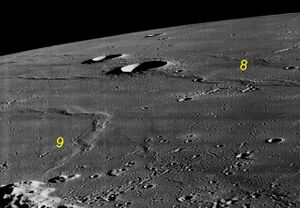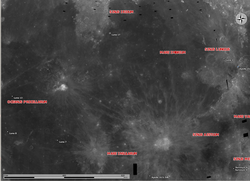Engineering:Luna 8
 Oblique view of Planitia Descensus showing crash site of Luna 8 and the landing point of Luna 9 (Lunar Orbiter 3 image) | |
| Mission type | Lunar lander |
|---|---|
| COSPAR ID | 1965-099A |
| SATCAT no. | 1810 |
| Mission duration | 3 days |
| Spacecraft properties | |
| Manufacturer | OKB-1 |
| Launch mass | 1,550 kilograms (3,420 lb) |
| Start of mission | |
| Launch date | 3 December 1965, 10:46:14 UTC |
| Rocket | Molniya 8K78 |
| Launch site | Baikonur 31/6 |
| Lunar impact (failed landing) | |
| Impact date | 6 December 1965, 21:51:30 UTC[1] |
| Impact site | [ ⚑ ] 9°06′N 63°18′W / 9.1°N 63.3°W[1] |

Luna 8 (E-6 series), also known as Lunik 8, was a lunar space probe of the Luna program. It was launched in on 3 December 1965 with the objective of achieving a soft landing on the Moon; however, its retrorocket firing occurred too late, and suffered a hard impact on the lunar surface on the Oceanus Procellarum (Ocean of Storms). The mission did complete the experimental testing of its stellar-guidance system and the ground-control of its radio telemetry equipment, its flight trajectory, and its other instrumentation.
This, the eleventh Soviet attempt to achieve a lunar soft landing, nearly succeeded. After a successful midcourse correction on 4 December, this spacecraft headed toward the Moon without any apparent problems. Just before the scheduled firing of its retrorocket, a command was sent to inflate cushioning air bags around the landing probe. However, a plastic mounting bracket apparently pierced one of the two air bags. The resulting ejection of the air put the spacecraft into a spin of about 12 degrees per second. The spacecraft momentarily regained its proper attitude, long enough for a nine-second-long retrorocket firing, but Luna 8 became unstable again. Without a retrorocket burn long enough to reduce its velocity sufficiently for a survivable landing, Luna 8 plummeted to the lunar surface and crashed at 21:51:30 UT on 6 December in the west of Oceanus Procellarum. The coordinates of the crash site are [ ⚑ ] 9°06′N 63°18′W / 9.1°N 63.3°W.[1]
See also
References
External links
| Preceded by Luna 7 |
Luna programme | Succeeded by Luna 9 |
